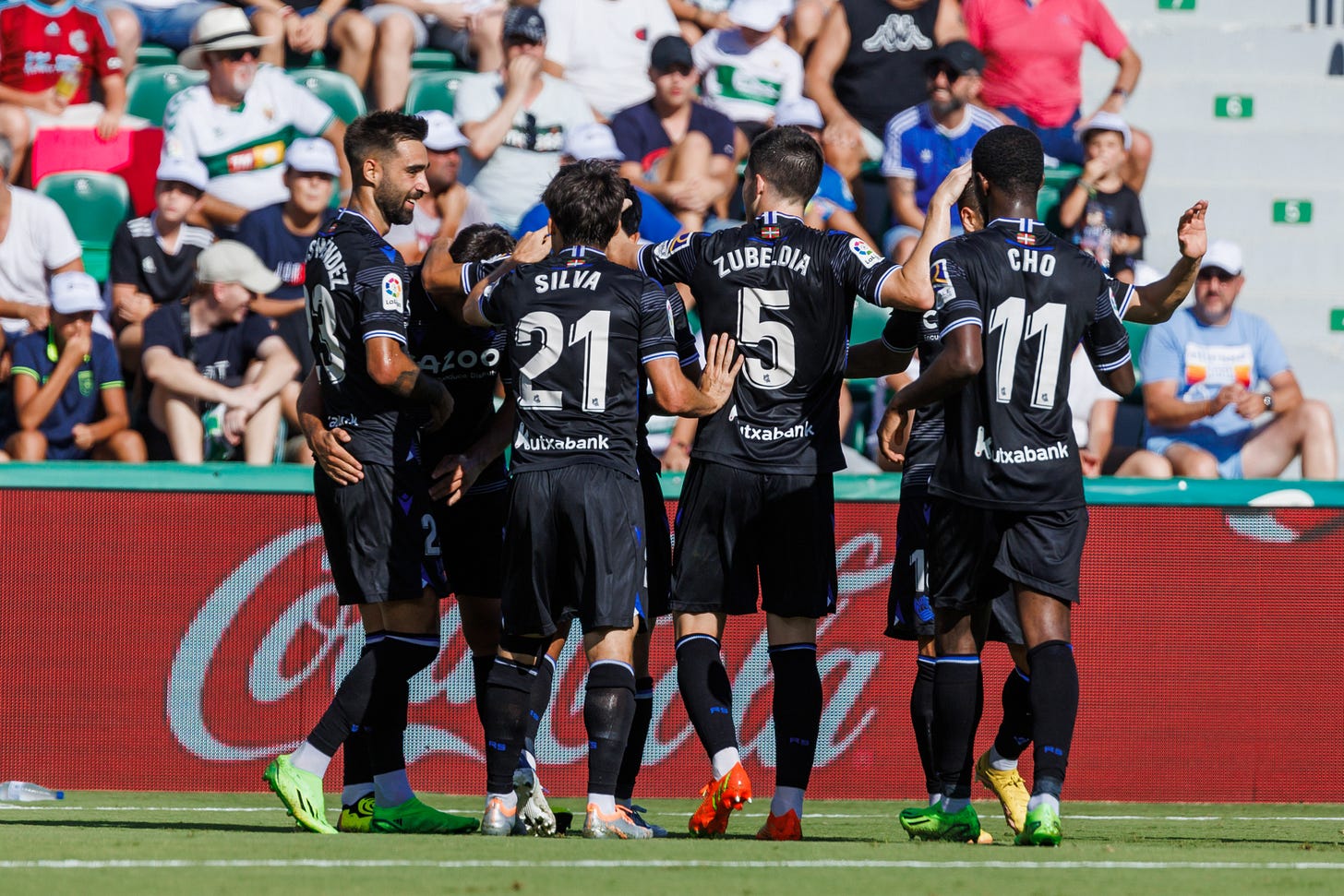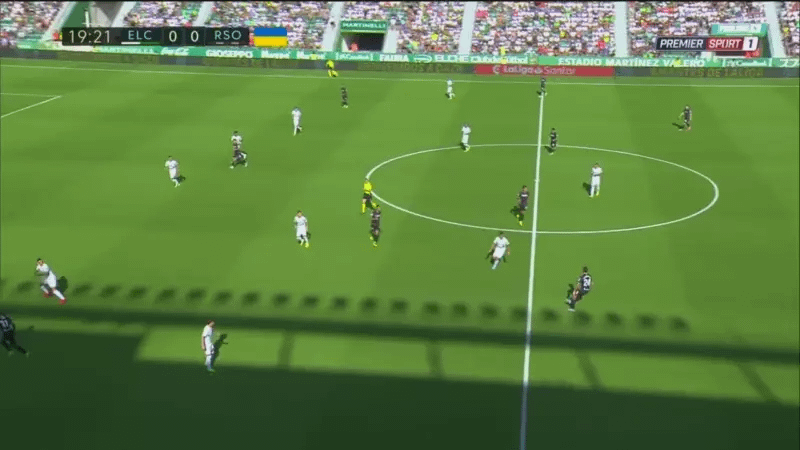Elche exasperated by striker-less Real Sociedad
In the wake of Alexander Isak's club-record sale, La Real made it two wins from two away games on the back of their midfield manipulation.
This weekend saw Real Sociedad return to the scene where it began. It was precisely at the Martínez Valero, just over four months ago, that they first rolled out the system that has come to stick for them: the diamond midfield. They won 2-1 on that day in April, but despite grabbing another win by a one-goal margin, the contents of the game were a little different this time round.
Real Sociedad have continued to use the system ever since that first game at Elche, while a pre-season in between has offered further opportunity to crystalise all of its functions. With more work and repetition, it’s logical that La Real would be better now than they were the first time round.
There were some alternatives on this occasion, however. The two Alexanders — Isak and Sørloth — weren’t occupying the front two this time, but newcomers Take Kubo and Mohamed-Ali Cho. From a pairing of number nines of varying profiles to one of two players who’ve spent most of their careers to date playing on the wing, it was a scenario that would test just how much weight of the game that Real Sociedad’s midfield four could carry.
As it turned out, the midfield diamond that is designed to overload the central areas of the pitch ended up attracting even more participation. Real Sociedad’s loss of a striker — in the (very) short-term — only served to strengthen their fluidity of play, as Elche’s central midfield pair of Gerard Gumbau and Omar Mascarell were swamped on all sides by willing receivers. Between those two and Elche’s back four, the confusion was established early on and only subsided once La Real had made the call to protect their lead.
This was the result of La Real’s growing comfort in the diamond shape, when combined with two ‘forwards’ without fixed positions. Their biggest attacking weapon on this occasion — in the absence of a natural presence in the penalty area — was that Elche simply didn’t know which players to pick up and which ones to let go. The home side spent the entire first half trying to get to grips with how to manage an already-overloaded midfield with an extra two players that persisted to elude defensive contact.
It was exactly in this scenario that the game’s winning goal was achieved. In a move which started from the goalkeeper, the rotations between David Silva (CAM), Brais Méndez (RCM) and Take Kubo (CF) while Real Sociedad were managing the ball from the back shifted Elche’s 4-4-2 shape into a vulnerable state. And by the time Silva and Kubo had made their opposite movements, Elche’s desperate attempt at an offside trap between a cobbled together back four of a CM, LB and two CB’s was duly punished.
Although Real Sociedad only won the game 1-0 — thanks to a series of moves missing the final pass or shot, plus Mikel Merino’s penalty miss — Elche remained in a daze as to how they could deal with the whirlwind of players and rotations just out of their reach. The game was littered with miscalculations in positioning on the part of the home side, with no Elche player able to act in the confidence that he was moving in accordance with his teammates.
The clip below was just minutes into the second half, following a break in which Francisco will have surely tried to address the doubts plaguing their midfield and defence out of possession. Although lacking the finish, David Silva’s run in behind came just at the point where Elche’s frustration at getting pressure on the ball had started to rise, and where the central defenders were again unsure whether to step out or hold their position.
Even when La Real eventually got round to bringing on a striker — the only one in their squad, 19-year-old Jon Karrikaburu — Elche were still at the mercy of the push-and-pull effect of the diamond and players in between the lines. In the below instance, Elche’s match-ups are again scrambled by the rotations in the away side’s midfield and Enzo Roco — who had only half stepped out to pressure Mikel Merino — unknowingly left an open passing lane into Karrikaburu.
Real Sociedad’s central aim with their 4-4-2 diamond — along with the basic premise that it fits the attributes of their midfielders — is to make the opponent defend with doubts. Is it a centre back or a midfielder who picks up David Silva between the lines? Is Brais Mendez playing as a forward, a winger or a midfielder at any given moment? Is it better to man-mark the four individual midfielders given the amount of rotations between them?
La Real’s comfort in the system is growing in line with its use, and it wasn’t only in attack that it aided them in Elche. The home side aren’t renowned for their pressure without the ball, and so the deliberately patient speed of play from La Real — when combined with their midfield advantage — meant that they could essentially defend for the first hour of the game through their own possession. The onus fell on the home side to step up to pressure the ball, but any confidence to do so had been zapped by the space they feared leaving for David Silva and co.
On the subject of individuals, the one new face within the rombo from last season’s game at Elche was Brais Méndez. His signing is one that feels instructive towards the long-term future of La Real’s system, as a former winger who developed his game playing more in central midfield areas under Eduardo Coudet at Celta Vigo. In replacing Rafinha, who has since returned to PSG, the 25-year-old has given a sharper feel to the midfield four as a younger player with a more associative style.
At least until Mikel Oyarzabal returns from injury, it seems highly likely that Real Sociedad’s fortunes will be linked with the diamond midfield. Or perhaps when Oyarzabal does return, he’ll do so as a central piece of a system that came to be during his absence.
In the meantime, Imanol Alguacil is driving performance through a moment in which his system of choice and the players within it are in similar ascendance. David Silva is in his best form at the club and looks well physically, Mikel Merino is the all-terrain guarantee, Brais Méndez is the fresh addition who is compatible on both sides of the ball and Martín Zubimendi is as improved as any player in La Liga over the last 18 months.
La Real won’t be heading their 4-4-2 diamond up with two non-strikers for much longer, but it will have been good for Alguacil — a coach who isn’t afraid of giving prominence to alternatives — to know his squad can function in a different way. On Elche’s part, they might even be hoping to get the more orthodox version next time.










